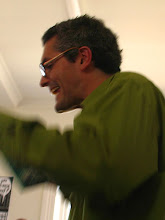speak. And I did. I really really did. So I turned tail and rode back east along the north bank of the Swan and got to the Heath Ledger Theatre just in time to hear Ross Gibson in excellent form, speaking on 'Systems of Feeling':
How indeed. Art, according to Ross, taking his cue from other root words like 'articulation' and 'arthritis', is a joint, a place where a 'turn' occurs, a point at which some move on the part of the recipient/participant can take place, taking them from their received self to... something, somewhere, someone else. Perhaps museums can be organised, designed, articulated so that these halts can occur, these transformations can be given space.
He then used a bunch of lines from 'All Day Permanent Red' (2003, Faber and Faber) by the poet Christopher Logue, I think these lines:
Drop into it.
Noise so clamourous it sucks.
You rush your pressed-flower hackles out
To the perimeter.
And here it comes:
The unpremeditated joy as you
- The Uzi shuddering warm against your hip
Happy in danger in a dangerous place
Yourself another self you found at Troy -
Squeeze nickel through that rush of Greekoid scum!
Oh wonderful, most wonderful and then again more wonderful
a bond no word or lack of words can break,
Love above love!
(Which made me very happy, this book and Logue's 'War Music' being 2004 birthday presents from Mark Scillio and Bruce Woolley, back when we were reading The Iliad together)
The Logue shows the transformative experience - 'yourself another self you found at Troy' - and eloquently expresses its in-the-moment invulnerability to articulation - 'a bond no word or lack of words can break'. Ross' question was, when the visitor/participant/audience returns from the sublime, 'What happens when the thinking starts again?'
What can be done for the turn from the aesthetic to the semantic? How can it be supported, braced, held?
He gave us a lot more did Ross Gibson, and he left us with an image of Pablo Fernandes de Queiros, a Portuguese navigator who in 1606 went into a forest on a Pacific island and emerged transformed.
"What happened in that forest?"
....................................................................................................................................................................
Also speaking on this last morning was Masaaki Morishita, author of 'The Empty Museum', speaking about the beginning of the cultural rescue operation that has been happening in Japan after the earthquake and tsunami of March of this year.
His talk was called 'Rescuing 'cultural properties, etcetera' after the tsumani in north-eastern Japan'.
I initially thought that the 'etcetera' was a bit unwieldy in that title but as Masaaki-san said:
In response to a question about the digitisation (that is, photographs and information about objects being recorded on-line) of the collections being rescued, his response was:
Another question was, 'how can we help?' and he seemed taken aback by that offer. My hand is up.
....................................................................................................................................................................
I needed to miss the mid-morning sessions, for the arrival in Perth of three very good reasons:
One
Two
And of course
So off we went to Alternating Currents at PICA, where the lads really enjoyed Taro Izumi's giant messy game. Then they went off to find the first accommodation for our shared holiday, and I returned to the last afternoon of the conference.
In the last session, Frank Howarth mused on the possibility of
that is, a global one, with ICOM (the International Council of Museums) being one contender, and the AAM (the American Association of Museums) being the other.
And the last paper of the conference was very sobering - an account by Professor Peter Read of differing approaches taken in Chile to represent the years of terror under the Pinochet regime. The question being, how do representations help or hinder the process of reconciliation? He particularly looked at a location, 'Londres 38', where horrific torture and murder had taken place, and, post-Pinochet, the difference between the individual and state representations of what had occurred there.
He called for us to consider these complexities when faced with remembering and representing trauma in our local spaces, and reminded us of the message of the voiceless:
"Do not forget me."
This statement was relayed in this conference particularly strongly by Lily Hibberd (her focus is on prisoners and prisons), Andrea Witcomb, Maasaki Morishita, and Peter Read. I salute them all.
Conference over, I sauntered off into the strong West Australian sun for the next adventure.
But that's another story.
















No comments:
Post a Comment